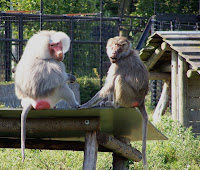 Charles Darwin
Charles DarwinThe principles of life on Earth may also be applied to life on other planets, with some exceptions. I am including here an extract from Marc D Hauser's book on Moral Minds. He is influenced in turn by the work of Eduard Tinkelpaugh, the 1920's psychologist, famous for his work with examining the intelligence levels of primates and monkeys.
'We do not know what it is like to have a primate experience of expectation, satisfaction and dissatisfaction. Tinkelpaugh proposed that the primate brain has evolved to respond to actions and events and set up expectations about, the causes and consequences to detect violations, using mimicry, learned behaviour and experiences.
I have listed the 5 principles of living as a primate, emanating from the studies of Tinkelpaugh, Darwin and others. These studies involved intelligent animals, primarily primates but occasionally dolphins and birds (Ravens and Jays).
Principle 1 - If an object moves on its own, it is an animal or part of an animal
Principle 2 - If an object moves in a particular direction towards another object or location, the targeted direction picks out or implies the object's goal
Principle 3 - If an object moves 'flexibly', changing direction in response to environmental objects or events, then it is rational
Principle 4 - If one object's action is followed closely by a second object's action, the second object's action is perceived as a socially intelligent response
Principle 5 - If an object is self-propelled, goal-directed and flexibly responsive to environmental constraints and events, then the object has the potential to cause harm or comfort to other similar objects.








No comments:
Post a Comment